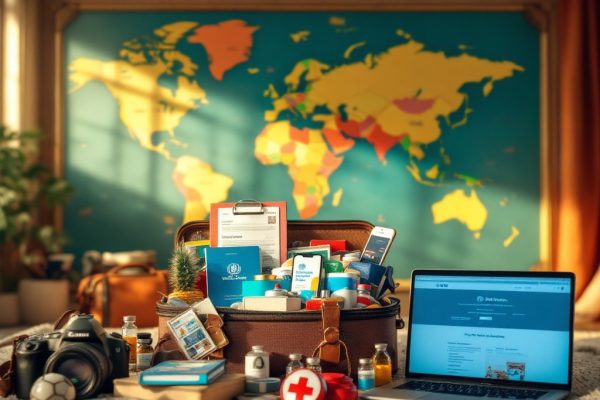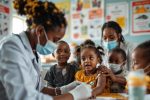What Are WHO Updates for Travelers
Planning international travel? Safeguard your health with crucial updates from the World Health Organization (WHO). Discover essential travel advisories, vaccination recommendations, and disease outbreak information, including Zika and SARS-CoV-2 guidance. Learn how to mitigate risks with practical tips on hygiene, mosquito repellent use, and safe food and water practices. Visit the WHO website now for a healthy and informed journey.
Important information

- The WHO provides crucial travel health information like disease outbreak updates, vaccination recommendations, and travel advisories on their website and through bulletins.
- Before and during travel, check the WHO website, but also consult your doctor or local health department for personalized advice.
- The WHO recommends a risk-based approach to travel. Assess your destination’s health risks, get needed vaccines, practice good hygiene, and use mosquito repellent. Check entry requirements and consider trip postponement if risks are high.
- Consult the WHO’s November 19, 2022 publication for detailed vaccination requirements and recommendations, especially for high-risk countries and malaria prevention.
- Stay informed about travel health notices and advisories for your destination, which offer important safety measures and outbreak updates. During outbreaks, follow WHO and local health authority advice.
Understanding WHO Updates for Travelers
The World Health Organization (WHO) provides travelers with essential updates on health risks and safety. This includes information on disease outbreaks, vaccination recommendations, and travel advisories. This comprehensive information is available on the WHO website. For more immediate updates, the WHO also issues health bulletins and announcements. While the WHO website offers valuable resources, travelers should consult their healthcare provider or local health department for personalized advice. Checking the WHO website before and during trips ensures access to the most current information.
Visit the WHO website for essential updates on health risks and safety, including disease outbreaks, vaccination recommendations, and travel advisories.
For immediate updates, refer to WHO health bulletins and announcements.
Consult your healthcare provider or local health department for personalized advice.
Check the WHO website before and during your trips for the most current information.
WHO Travel Advice and Guidelines
Planning your international travels? The World Health Organization (WHO) offers essential resources for a safe and healthy journey. Consult their website for crucial advice, including recommended vaccinations, information on local diseases, and safe food and water practices. Stay informed about destination-specific health recommendations and updates on outbreaks, such as the Zika virus. For further guidance, consult a healthcare professional or your local health department.
How WHO Issues Travel Advice
To help travelers stay safe, the World Health Organization (WHO) provides advice based on current health risks, including diseases like SARS-CoV-2. Their guidelines offer ways to mitigate these risks. Travelers can find the latest updates on the WHO website. Consulting a healthcare professional before and during your trip is also recommended.
What Travel Restrictions Does WHO Advise Against?
The WHO advises against travel and trade restrictions for Rwanda in response to the Marburg virus outbreak. Instead, travelers are encouraged to practice safer habits. Prioritize smart precautions over broad restrictions.
Public Health Considerations for Travelers
Plan your trip with confidence using the WHO’s travel advice. Their international travel and health page provides destination-specific recommendations and essential updates. Ensure your vaccinations are up-to-date. Practice safe food and water habits, and use mosquito repellent in affected areas. Maintaining good hygiene will minimize infection risks. For vaccination requirements, refer to the WHO’s November 19, 2022 publication.
Planning your trip
When planning your trip, consider:
- your vaccination history,
- current health status,
- destination,
- itinerary, and
- trip duration.
During an outbreak
In the event of a disease outbreak, follow advice from:
- the WHO, and
- local health authorities.
For the latest information on Zika virus transmission and sporadic infection clusters, consult the WHO’s Zika guidance, updated as of November 23, 2023.
Travel Health Notices and Advisories
Staying healthy while traveling is crucial. Before your trip, consult reliable sources like the WHO, your local health department, and travel advisory services for travel health notices and advisories. These resources provide vital information on disease outbreaks, recommended vaccinations, and important safety measures for your destination. Staying informed can significantly impact your trip.
Check travel health notices and advisories. Consult reputable sources like the WHO, your local health department, and travel advisory services for crucial information on disease outbreaks, recommended vaccinations, and essential safety precautions for your destination.
Ensure your vaccinations are current. Update your vaccinations based on the recommendations for your destination to minimize health risks.
Maintain good hygiene practices. Simple precautions like regular handwashing can significantly reduce the risk of illness.
Use mosquito repellent. In regions with mosquito-borne illnesses, using repellent is a crucial step for protection.
Consult the WHO’s international travel and health page. This resource offers valuable destination-specific updates and recommendations for a safe and healthy journey.
Understanding Travel Health Notices
Stay informed about health risks at your destination with Travel Health Notices (THNs). These notices provide practical tips to help you avoid infections and other health issues. THNs cover:
- disease outbreaks,
- unusual health events,
- natural disasters and human-caused emergencies.
They also address the health risks associated with mass gatherings. For your protection, THNs may recommend vaccinations, emphasize good hygiene, and suggest avoiding high-risk areas. They often advise using mosquito repellent and highlight the importance of safe food and water practices.
Checking for Travel Alerts and Advisories
Stay informed about health risks for safe and healthy travels. Consult the World Health Organization (WHO) website for crucial updates. Supplement this with information from health department websites and travel advisories. Subscribe to health newsletters for timely alerts.
WHO Resources
The WHO issues travel alerts based on health risks, including disease outbreak information and vaccination recommendations. Their international travel and health page offers valuable resources and recommendations for various destinations.
Travel Health Notices
Travel Health Notices provide essential information to keep travelers aware of health risks and outbreaks at their destinations. During outbreaks, follow recommendations from both the WHO and local health authorities.
Risk-Based Approach to International Travel
The WHO recommends a risk-based approach for safe international travel, especially during a pandemic. Assess the health risks at your destination, including disease prevalence and the local healthcare system’s capacity. Check entry requirements before your departure.
How WHO Recommends Risk Mitigation
Get vaccinated against potential diseases prevalent in your destination.
Avoid areas with known health risks or ongoing outbreaks.
Maintain good hygiene practices, such as frequent handwashing.
Familiarize yourself with local health services and facilities.
Consider postponing or canceling your trip if the health risks are too high.
Consult the WHO website for specific outbreak information and further advice.
Take precautions such as consuming safe food and water and using mosquito repellent.
Vaccination Requirements and Recommendations by WHO
The WHO offers essential vaccination guidance for international travelers to protect them from common diseases. Consult their November 19, 2022, publication for detailed information on required and recommended vaccinations, as well as advice on malaria and other health risks. This knowledge helps travelers meet health regulations and stay well. Before traveling, review your vaccination history and ensure you have the necessary shots. The WHO recommendations consider factors such as your health, destination, and trip length, including specific health risks at your destination. Some countries require specific vaccinations, like yellow fever, for entry. Be sure to check these destination-specific rules to ensure a safe and compliant trip, ultimately protecting your health. For specific vaccination recommendations, international travelers should consult the WHO guidelines, which vary depending on the destination and potential health risks.
Understanding WHO’s Vaccination Recommendations
Planning your trip? Consult the World Health Organization (WHO) website or your doctor for personalized vaccination recommendations. The WHO’s key publication from November 19, 2022, details important vaccinations, including malaria prevention, for international travelers. Your vaccination needs depend on your previous immunizations, current health, and your trip’s destination and duration.
Vaccination Guidelines for International Travelers
Prioritize your health when planning international travel. The World Health Organization (WHO) offers essential vaccination guidelines in their November 19, 2022, publication. This resource lists recommended vaccinations for diseases like yellow fever and malaria, alongside region-specific health advice. Crucially, practice good hygiene, use mosquito repellent, and avoid contaminated food and water. Stay informed about health risks by checking Travel Health Notices for outbreak updates. In case of an outbreak, follow WHO guidance and consult local health authorities for advice on vaccinations and preventive measures. The WHO website’s travel advice section provides current advisories, vaccination information, and other helpful resources. When reviewing these recommendations, consider your personal health, including your vaccination history, current health status, itinerary, destination, and trip length.
Vaccination and Malaria Prophylaxis Recommendations
Planning a trip to a high-risk country? Consult the World Health Organization (WHO) guidelines for recommended vaccinations and malaria prevention. Their advice is crucial, especially regarding vaccinations like yellow fever and preventative measures against malaria, including medication. Understanding your destination’s health risks and taking appropriate precautions is essential. For detailed information, refer to the WHO publication dated November 19, 2022.
Vaccinations
Traveling to a high-risk area? The WHO recommends specific vaccinations depending on the region, such as yellow fever, typhoid, and hepatitis A and B.
Malaria Prevention
Malaria poses a significant threat in many countries. The WHO provides destination-specific advice on prevention, including information on preventative medications, mosquito avoidance strategies, and the importance of prompt diagnosis and treatment. Consult your doctor for personalized recommendations.
Vaccination Needs for High-Risk Countries
Before traveling, the WHO recommends consulting the International Health Regulations (2005) for vaccination requirements. Travelers should also review the WHO’s November 19, 2022, publication for specific vaccination recommendations, particularly if traveling to high-risk areas. This publication details vaccinations for diseases like yellow fever, meningitis, and polio. It also addresses malaria prevention and other travel-related health risks. This makes it an invaluable resource for any traveler.
WHO’s Recommendations on Malaria Prophylaxis
Malaria prevention, as advised by the World Health Organization (WHO), involves chemoprophylaxis, which means taking antimalarial medications. The specific medication and its dosage depend on several factors, including your travel destination, the malaria risk level of the area, your age, pregnancy status, and any other health conditions you may have. It is essential to consult a healthcare professional or travel clinic for personalized advice and to obtain a prescription. This preventative measure is vital for ensuring safe travels to regions where malaria is prevalent.
Health Considerations for International Travelers
The World Health Organization (WHO) offers quarantine guidelines, focusing on isolating individuals exposed to infectious diseases. Quarantine durations vary depending on the disease’s incubation period. During outbreaks, specific control measures may be necessary, such as vaccination campaigns and travel restrictions. The WHO provides recommendations for these measures. Travelers should stay updated on the latest information by checking the WHO’s international travel and health page.
WHO Guidelines on Quarantine Measures
The World Health Organization (WHO) provides traveler quarantine guidance based on health assessments. For the latest requirements and recommendations, visit the WHO website. Staying informed is crucial.
Addressing Specific Disease Outbreaks
Prioritize your health by adhering to WHO and local health advisories, especially during disease outbreaks. This might include vaccinations or other preventative measures. For example, WHO’s May 24, 2024 report highlighted recent dengue outbreaks in areas inhabited by Aedes mosquitoes, the carriers of this disease. Exercise caution and stay informed about the risks if you travel to these regions.

















